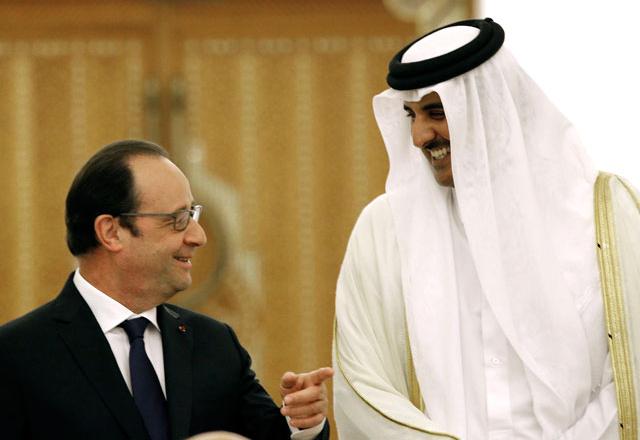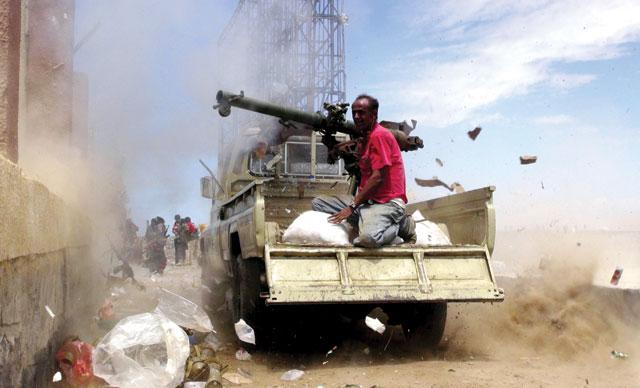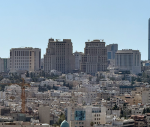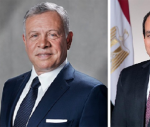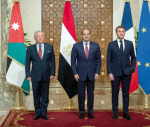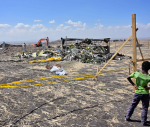You are here
Saudi king warns of Iran threat; rebels hit border town
By AFP - May 05,2015 - Last updated at May 05,2015
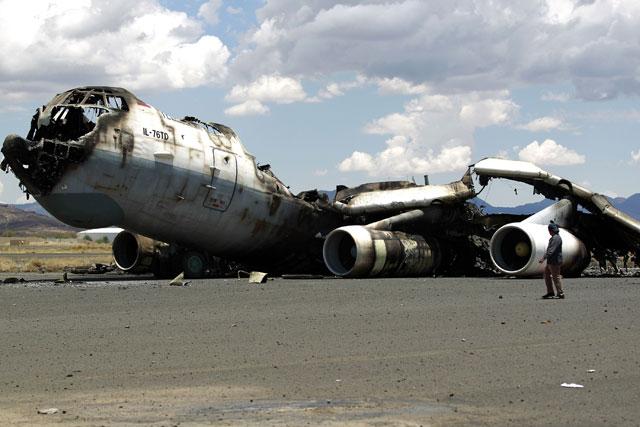
RIYADH — Saudi Arabia's King Salman Bin Abdulaziz said Tuesday that Gulf leaders must stand up to Iran, as Yemeni rebels backed by Tehran attacked a Saudi border town with mortar shells.
King Salman's call came at a meeting of Gulf monarchs in Riyadh that was also attended by French President Francois Hollande, who said his country was "by the side" of Gulf nations.
The Gulf Cooperation Council (GCC) summit came amid mounting international concern about the impact on civilians of Saudi-led air strikes targeting Yemeni rebels.
In a clear reference to Iran, King Salman spoke of the need to confront an external threat that "aims to expand control and impose its hegemony", threatening regional stability and creating "sectarian sedition".
Soon afterwards, the Saudi-led coalition carrying out air raids in Yemen said mortar shells fired by Iran-backed Houthi Shiite rebels from across the border had struck the Saudi town of Najran.
Coalition spokesman Brigadier General Ahmed Assiri told Saudi television that hospitals, schools and houses had been hit.
“Air and ground forces will respond in the right way to these hazardous acts and will not allow them to be repeated,” Assiri said.
The Saudi military had already deployed Apache combat helicopters to target the rebels in the border area, he added.
Hollande, the first Western leader to attend a GCC summit, said France shared the dangers facing the region and he had come “to affirm the commitment of France to be by your side”.
The Riyadh summit brought together leaders from Bahrain, Kuwait, Oman, Qatar, Saudi Arabia and the United Arab Emirates.
All but Oman are in the Saudi-led Sunni coalition that on March 26 launched air strikes in Yemen against the Houthi rebels and their allies who have seized large parts of the country including Sanaa.
Yemeni President Abed Rabbo Mansour Hadi fled to Riyadh when the rebels advanced on his southern refuge Aden.
Concern has mounted over the air campaign, which has continued despite the coalition announcing late last month it was moving on to a new phase.
Humanitarian crisis
The United Nations says at least 1,200 people have been killed in Yemen since March 19, and has repeatedly warned that the already impoverished Arabian Peninsula state faces a major humanitarian crisis.
Saudi Arabia has said it is considering temporary halts in air strikes to allow aid deliveries.
Hollande told the summit France supports coalition efforts “to ensure the stability of Yemen”.
His visit comes as Paris strengthens its political and economic relations with the oil- and gas-rich Gulf monarchies.
He arrived in Riyadh from GCC member Qatar after attending the signing of a 6.3-billion-euro ($7-billion) deal between French aerospace firm Dassault and Qatari defence officials.
The agreement includes an order for 24 Rafale fighter jets, with an option on a further 12.
On Tuesday, French Foreign Minister Laurent Fabius said Paris and Riyadh are also discussing 20 economic projects worth “tens of billions of euros”.
Hollande’s visit comes as US President Barack Obama prepares to host GCC leaders for talks next week.
Most GCC countries are also part of a US-led air coalition targeting Daesh terror group in Iraq and Syria.
Tight security
Security was high in Riyadh Tuesday after Daesh threats to attack the kingdom, with green-bereted Royal Guards manning checkpoints and a sniffer dog checking vehicles.
Both Paris and Washington have sought to reassure the Gulf states about an international accord being finalised over Iran’s nuclear programme.
The Gulf fears Iran could still develop an atomic bomb under the deal that would limit its nuclear capabilities in return for lifting crippling international sanctions.
Tehran denies trying to develop a nuclear weapon.
“I know that Iran is at the heart of your preoccupations,” Hollande said.
The only other foreign leader invited to a GCC summit was Iran’s then-president Mahmoud Ahmadinejad, in 2007.
US Secretary of State John Kerry will visit Saudi Arabia this week before security talks in France.
On Monday after Hollande met King Salman, a joint French-Saudi declaration “stressed the need to achieve by June 30, a robust [nuclear] agreement that is lasting, verifiable, indisputable and binding for Iran” which must “ensure” it would not develop an atomic bomb.
On Yemen, they stressed the importance of implementing a UN Security Council resolution calling on the rebels to withdraw from all areas they have seized since July 2014.
A source familiar with the situation said France has provided the Saudi-led coalition with satellite imagery of Yemen.
Related Articles
French President Francois Hollande sought to boost ties in the Gulf Monday as he oversaw the signing of a warplanes deal with Qatar and arrived in Saudi Arabia for a summit.
Solutions will be hard to find Tuesday when Gulf monarchs hold their annual summit in a region threatened by jihadists and a war in Yemen that has raised tensions with Iran.
The Saudi-led coalition battling rebels in Yemen sent a "limited" force to the city of Aden Sunday, Yemeni sources said, in what would be its first ground deployment inside the country.

Opinion
Apr 07, 2025
Apr 07, 2025
Apr 07, 2025
Apr 06, 2025
- Popular
- Rated
- Commented
Apr 07, 2025
Apr 07, 2025
Apr 07, 2025
Newsletter
Get top stories and blog posts emailed to you each day.


